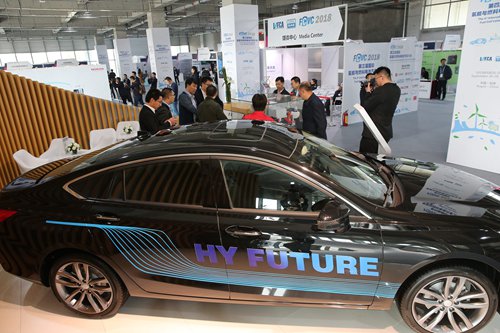HOME >> BUSINESS
China steps up investment in hydrogen amid renewable energy push
By Wang Cong and Shen Weiduo Source:Global Times Published: 2019/7/8 21:58:40
Policy aims for long-term solution as short-term constraints abundant: analysts

Participants attend the third International Hydrogen Fuel Cell Vehicle Congress, which was held in Nantong, East China's Jiangsu Province in October 2018. Photo: VCG
China has been ratcheting up investments in hydrogen energy over the past few months with central and local governments throwing considerable support and policy guidance at industry participants to explore what is widely considered a promising source of renewable energy.
As an ardent supporter of the nascent clean energy sector, the development of hydrogen stations for new energy vehicles was included in the Government Work Report for the first time this year, a move that Chinese industry participants see as the government's endorsement of the hydrogen energy economy.
Apart from the national policy guidance from the central government, local authorities have actively rolled out plans to boost the sector.
For instance, Wuhan, capital of Central China's Hubei Province, announced plans to build up to 20 hydrogen fueling stations, and to have 3,000 vehicles powered by hydrogen fuel cells by 2020. Shanghai said it will install 50 hydrogen fueling stations and produce at least 20,000 passenger hydrogen vehicles by 2025.
Many domestic automobile companies are actively laying out their hydrogen fuel cell plans.
Great Wall Motor has invested more than 1 billion yuan ($149 million) in research and development in hydrogen energy and fuel cell vehicles.
"Unlike China, there aren't many countries that can make this technology possible, because you have to rebuild a whole system to achieve that. It's expensive and a huge undertaking," Han Xiaoping, chief information officer at China5e.com, a website specializing in energy information and consulting services, told the Global Times on Monday.
China is the world's largest hydrogen producer by a long way.
It produces about 22 million tons of hydrogen per year, accounting for one-third of the world's production, according to a report in the Economic Daily on Monday.
With years of investment and layout, the country's hydrogen industry has gradually taken shape, the report said, adding that China is expected to become the world's largest hydrogen and fuel cell market by 2030, and that hydrogen energy will support 10 percent of domestic energy demand by 2040.
Barriers ahead
While China, with its massive state and private resources, is among the best-positioned to lead the drive for hydrogen energy, such investments are unlikely to yield any short-term breakthroughs as economic and technological challenges associated with hydrogen are abundant, analysts noted.
"One of the major problems is that hydrogen is much more expensive than both electricity and fossil fuels such as petroleum, since it's difficult to generate," said Lin Boqiang, dean of the China Institute for Studies in Energy Policy at Xiamen University.
He noted that there remain technology barriers such as storage and transportation, which means it is difficult to apply the new energy on a large scale.
"Hydrogen is more likely an attempt and option that China could resort to as it has been pursuing energy safety and a better environment over the past years," Lin told the Global Times on Monday, adding that development in the sector is not a matter of three or five years.
With government support, companies and industry participants may see opportunities, but those opportunities are still far away as the industry is in its infancy, said Lin.
Meanwhile, despite the importance it has been given, hydrogen is currently only involved in the overall development plan of the new energy automobile industry in China, and there is no top-level design and strategic planning about the sector itself, experts said.
Countries such as Japan, Europe and South Korea have all issued clear hydrogen energy roadmaps.
Newspaper headline: China steps up investment in hydrogen
Posted in: INDUSTRIES,BIZ FOCUS